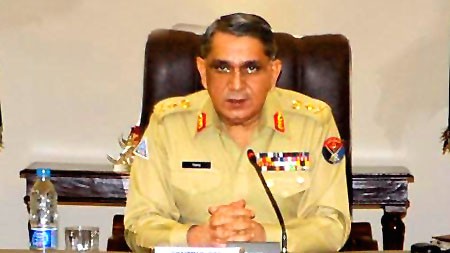
“We have to be mindful of the blatant pursuit of military preponderance in our neighbourhood. Growing power imbalance due to the continuous build-up of a massive military machine… especially after a very exceptional civil nuclear deal, and notions of two front wars, are all destabilising trends, carrying implications for Pakistan’s security,” the CJCSC told a gathering at National Defence University.
General Majeed said Pakistan has always supported non-proliferation efforts as a responsible nuclear weapon state.
The Foreign Office also added its voice to Pakistan’s bold defence of its nuclear cooperation with China by rejecting objections – including those of the US -- to the deal. The FO said the cooperation was under the safeguards of the International Atomic Energy Agency.
“Any apprehensions in this regard are unnecessary,” FO spokesman Abdul Basit told a routine press briefing here on Thursday.
He said there was a trust deficit between India and Pakistan. Islamabad is fighting against terrorism to safeguard its own interests and not for those of anyone else, he said.
He said that cooperation between China and Pakistan in the field of peaceful nuclear technology dated back many years. He also cited the statement issued by the Chinese foreign ministry issued in this regard on Thursday.
Terming the recent statement by the Indian foreign secretary a manifestation of the mistrust between the two countries, he suggested that this should be handled through bilateral dialogue. He expressed the hope that such talks will yield results that will benefit both the countries as well as the region.
Abdul Basit said that an inter-ministerial meeting was called to form a strategy for talks with India and it has prepared recommendations for the political leadership. They are being sent to the prime minister for approval. He said Pakistan is already working for promotion of peace and security in the region and wanted positive dialogue with India for peace in the region. He said that the issue of Indian involvement in Balochistan will be discussed.
He said that there was no connection between the visits of American functionaries and the Indian leaders to Pakistan. Replying to a question about the statement of the defence secretary before the public accounts committee that if coalition support funds are not released shortly, Pakistan will withdraw its forces from the Western borders, he said that there is no such thing as Pakistan is not fighting a proxy war against terrorism rather it is doing so in its own interest.
He said there was some delay in the provision of the coalition support fund, however, some of the tranches were issued this year, most of the dues of 2008-09 have been paid while the remaining of six to seven hundred million dollars will be paid soon.
He said strategic dialogue in different fields is taking place in the current month. He said USA has expressed its support to Pakistan and 25 to 30 projects have been identified for cooperation in the energy sector.
Published in the Express Tribune, June 18th, 2010.




1732003896-0/Zendaya-(1)1732003896-0-165x106.webp)
1732011525-0/Express-Tribune-(8)1732011525-0-270x192.webp)
1732004108-0/Express-Tribune-(5)1732004108-0-270x192.webp)

1732000275-0/Untitled-design-(9)1732000275-0-270x192.webp)








COMMENTS (2)
Comments are moderated and generally will be posted if they are on-topic and not abusive.
For more information, please see our Comments FAQ